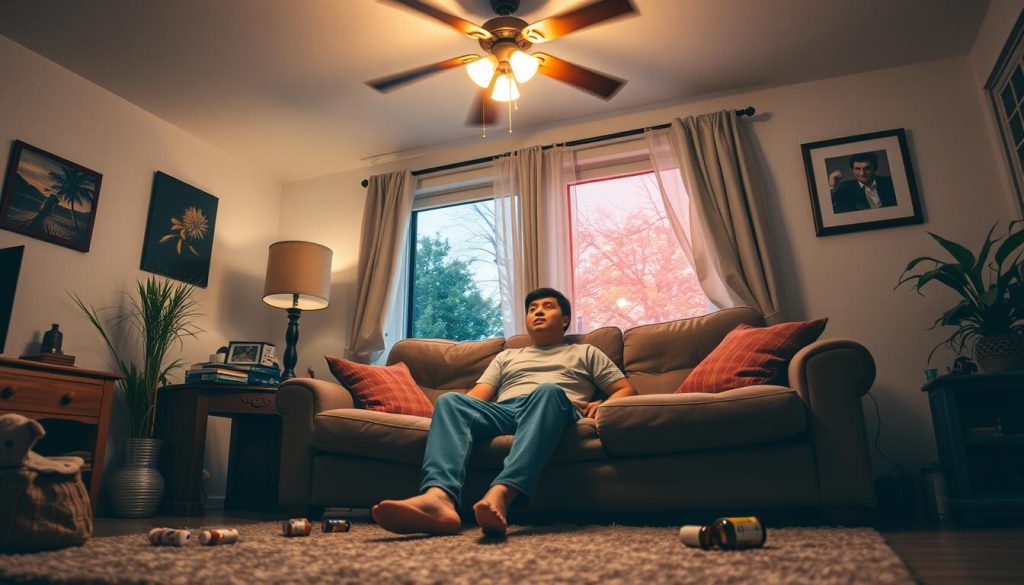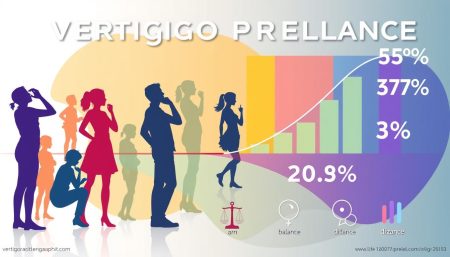Vertigo can make you feel like your world is spinning. It often comes without warning, leaving you feeling off-balance. Knowing what causes vertigo is crucial for managing it.
Spotting vertigo triggers helps you take charge. By avoiding these triggers, you can reduce vertigo episodes. This guide will explore the many causes of vertigo attacks.
Learn about the common causes of vertigo. With this knowledge, you can better handle and prevent these episodes. Let’s uncover the mysteries of vertigo triggers together.
Understanding Vertigo: A Comprehensive Overview
Vertigo is a complex condition that affects millions worldwide. It’s often mistaken for simple dizziness, but its causes and effects are far more specific. Let’s delve into the world of vertigo to understand what triggers vertigo and its underlying mechanisms.
Defining Vertigo vs. Dizziness
Vertigo is a distinct sensation of spinning or movement when you’re actually still. Unlike general dizziness, vertigo causes can be traced to specific issues within the balance system. This false perception of motion can be disorienting and even debilitating for some individuals.
The Inner Ear’s Role in Balance
The inner ear plays a crucial role in maintaining balance. It houses tiny structures that detect head movements and send signals to the brain. When these structures are disturbed, it can lead to vertigo episodes. Understanding this connection is key to identifying what triggers vertigo in many cases.
Types of Vertigo Episodes
Vertigo episodes can vary in duration and intensity. They’re often categorized based on their underlying causes:
| Type | Duration | Common Triggers |
|---|---|---|
| BPPV | Seconds to minutes | Head position changes |
| Ménière’s Disease | 20 minutes to several hours | Salt intake, stress |
| Vestibular Neuritis | Days to weeks | Viral infections |
By understanding these different types and their triggers, individuals can better manage their condition and seek appropriate treatment. Recognizing what triggers vertigo is the first step towards effective management and improved quality of life.
What Triggers Vertigo: Essential Facts to Know
Vertigo can be triggered by many things, and what works for one person might not work for another. Knowing what triggers vertigo is important for managing it well. Things that can make vertigo worse can be as simple as moving your head or as complex as a medical condition.
Finding out what specifically triggers your vertigo is the first step to preventing it. There are several types of triggers, including:
- Head position changes
- Medical conditions
- Environmental factors
- Lifestyle choices
- Medications and substances
Everyone reacts differently to these triggers. Keeping a diary of when you get vertigo can help figure out what’s causing it. This info is key to finding the right ways to manage vertigo.
| Trigger Category | Examples | Potential Remedies |
|---|---|---|
| Head Movements | Sudden turns, looking up | Slow, controlled movements |
| Medical Conditions | Inner ear disorders, migraines | Targeted medical treatment |
| Environmental | Bright lights, heights | Avoid triggers, use sunglasses |
| Lifestyle | Stress, lack of sleep | Stress management, sleep hygiene |
| Substances | Alcohol, certain medications | Moderation, medication adjustments |
By understanding and dealing with these triggers, you can reduce how often and how bad vertigo episodes are. Working with your healthcare team can help find better ways to manage vertigo and improve your life.
Head Position Changes and Movement-Related Triggers
Vertigo symptoms can be triggered by simple head movements. Knowing what causes vertigo helps manage it. Let’s look at how everyday actions can cause a spinning feeling.

Sudden Head Movements
Quick head turns or tilts can upset your inner ear’s balance. This might cause a brief but intense dizziness. Activities like checking blind spots while driving or reaching for high objects can trigger these episodes.
Lying Down and Rolling Over
Bedtime can be tough for those with vertigo. Lying down or changing positions in bed might make the room spin. This vertigo is often linked to BPPV, where tiny crystals in the inner ear become dislodged.
Looking Up or Down
Tilting your head back to look at the sky or bending forward to tie your shoes can trigger vertigo. These movements shift the fluid in your inner ear, potentially causing a loss of balance. People working at heights or those who frequently need to look up might experience more frequent episodes.
By recognizing these common triggers, you can take steps to minimize your risk of vertigo attacks. Simple adjustments to how you move can make a big difference in managing symptoms and improving your quality of life.
Medical Conditions That Can Trigger Vertigo Episodes
Vertigo can be caused by many medical conditions in the inner ear. Knowing what triggers vertigo is key to finding the right treatment. Let’s look at some common conditions linked to vertigo.
Benign Paroxysmal Positional Vertigo (BPPV) is a common cause of vertigo. It happens when tiny calcium crystals in the inner ear move out of place. This causes brief, sudden dizziness when you move your head in certain ways.
Meniere’s disease is another condition that can cause vertigo. It’s marked by recurring vertigo, hearing changes, and ringing in the ears. The exact reason is still a mystery, but it’s thought to be linked to fluid buildup in the inner ear.
Vestibular neuritis, an inflammation of the vestibular nerve, can also cause severe vertigo. This usually comes from viral infections and can lead to vertigo that lasts for days.
| Condition | Key Symptoms | Duration of Vertigo |
|---|---|---|
| BPPV | Sudden dizziness with head movements | Seconds to minutes |
| Meniere’s Disease | Vertigo, hearing loss, tinnitus | 20 minutes to several hours |
| Vestibular Neuritis | Severe vertigo, nausea, balance issues | Days to weeks |
Other conditions that can cause vertigo include migraines, brain tumors, and multiple sclerosis. If you keep getting vertigo, seeing a doctor is crucial. They can help find the cause and suggest the right treatment.
Environmental Factors and Sensory Triggers
Our surroundings greatly affect vertigo symptoms. Many environmental elements can make vertigo worse. Knowing these triggers helps manage and prevent vertigo episodes.
Visual Stimuli and Motion
Moving objects or patterns often trigger vertigo symptoms. Scrolling on screens, watching fast-paced videos, or viewing repetitive visual patterns can cause dizziness. These visual stimuli confuse the brain’s balance center, leading to vertigo in sensitive individuals.
Lighting Conditions
Bright or flickering lights are common vertigo symptoms triggers. Fluorescent lighting, strobe effects, or sudden changes in light intensity can disrupt the inner ear’s balance mechanism. Dim lighting or complete darkness might also cause disorientation and vertigo in some people.
Height-Related Triggers
For many, heights intensify vertigo symptoms. Looking down from tall buildings, bridges, or even standing on a ladder can induce severe dizziness. This reaction, known as height vertigo, stems from the brain’s difficulty processing the visual input at heights.
| Environmental Trigger | Effect on Vertigo | Prevention Strategy |
|---|---|---|
| Moving visual patterns | Confusion in balance center | Limit screen time, use anti-glare filters |
| Bright/flickering lights | Disruption of inner ear balance | Use soft, consistent lighting |
| Heights | Intense dizziness and disorientation | Gradual exposure therapy, avoid looking down |
By recognizing these environmental vertigo triggers, individuals can take steps to minimize their exposure and reduce the frequency of vertigo episodes. Creating a vertigo-friendly environment is key to managing this challenging condition.
Lifestyle-Related Vertigo Triggers
Your daily habits can greatly affect vertigo. Knowing these lifestyle factors is key to managing symptoms and finding good vertigo remedies.

Sleep Deprivation
Not getting enough sleep can make vertigo worse. When you’re tired, your balance system doesn’t work right. This raises the chance of vertigo episodes. Try to sleep 7-9 hours each night to lessen vertigo triggers.
Stress and Anxiety
High stress and anxiety can make vertigo symptoms worse. These feelings can tighten muscles and mess with your balance. Use deep breathing or meditation to handle stress and reduce vertigo.
Dietary Factors
Some foods and drinks can trigger or make vertigo worse. Common ones include:
- Caffeine
- Alcohol
- High-sodium foods
- MSG (monosodium glutamate)
Keeping a food diary can help find out what triggers vertigo for you. It’s important to work with a healthcare provider to find the right diet and lifestyle changes for you.
Weather and Atmospheric Pressure Changes
Weather changes can be big vertigo triggers, especially for those who struggle with balance. Shifts in atmospheric pressure, humidity, and temperature can mess with the inner ear. This can lead to vertigo episodes. These factors can make vertigo worse, so it’s important to know about them.
Changes in barometric pressure are especially important. When air pressure changes, it can upset the balance between the inner ear and the outside world. This can make the fluid in the inner ear move, which might trigger vertigo in some people.
Some weather patterns are more likely to cause vertigo:
- Thunderstorms and quick drops in pressure
- Coming cold fronts
- High humidity
- Big changes in temperature
Knowing about these weather-related vertigo triggers can help you prepare. By watching the weather forecast and planning your activities, you can lower your chance of getting vertigo from the weather.
| Weather Condition | Potential Impact on Vertigo |
|---|---|
| Low Pressure Systems | Increased risk of vertigo episodes |
| High Humidity | May worsen symptoms in some individuals |
| Rapid Temperature Changes | Can trigger or intensify vertigo |
| Windy Conditions | May affect balance and spatial orientation |
Medications and Substances That May Trigger Vertigo
Certain medications and substances can trigger vertigo episodes. Knowing these causes can help manage symptoms better.
Prescription Medications
Some prescription drugs can trigger vertigo or make symptoms worse. These include:
- Blood pressure medications
- Antidepressants
- Anticonvulsants
- Some antibiotics
If you get vertigo from medication, talk to your doctor about other options.
Over-the-Counter Drugs
Some over-the-counter drugs can also cause vertigo. Be careful with:
- Aspirin
- Antihistamines
- Cold and flu medications
Always check labels and know the side effects that might affect your balance.
Alcohol and Caffeine
Alcohol and caffeine can affect your inner ear and trigger vertigo. Drinking in moderation is important. Knowing what triggers vertigo can help manage it and other health issues.
| Substance | Potential Effect on Vertigo | Recommendation |
|---|---|---|
| Alcohol | Can disrupt inner ear fluid balance | Limit consumption or avoid if sensitive |
| Caffeine | May increase dizziness in some people | Monitor intake and effects |
| Nicotine | Can affect blood flow to the inner ear | Consider quitting or reducing use |
By figuring out what triggers your vertigo, you can reduce episodes and live better.
Physical Exertion and Exercise-Related Triggers
For some, physical activity can trigger vertigo symptoms. Intense workouts or sudden movements during exercise might cause dizziness or a spinning sensation. It doesn’t mean you should avoid exercise, but it’s wise to be careful about how you move.
Certain exercises are more likely to cause vertigo triggers. Activities that involve quick head movements or changes in position, like yoga or gymnastics, can be challenging. Swimming, where you turn your head to breathe, might also lead to vertigo symptoms. It’s crucial to find a balance between staying active and managing your vertigo.
There are ways to exercise safely if you’re prone to vertigo. Start slowly and build up gradually. Focus on low-impact activities like walking or stationary cycling. Always warm up before exercising and cool down after. If you feel dizzy during a workout, stop and rest. Understanding your vertigo triggers and remedies can help you create a safe exercise routine that keeps you healthy without worsening your symptoms.
FAQ
Q: What is the difference between vertigo and dizziness?
A: Vertigo is a feeling of spinning or movement when you’re still. Dizziness is a broader term for feeling lightheaded or unsteady. Vertigo often comes from inner ear problems, while dizziness can have many causes.
Q: Can sudden head movements trigger vertigo?
A: Yes, sudden head movements can cause vertigo, especially in people with BPPV. Quick turns, looking up or down, or rolling over in bed can trigger symptoms.
Q: What medical conditions are commonly associated with vertigo?
A: Conditions like Benign Paroxysmal Positional Vertigo (BPPV), Meniere’s disease, and vestibular neuritis can cause vertigo. These usually affect the inner ear or balance system.
Q: Can stress and anxiety trigger vertigo episodes?
A: Yes, stress and anxiety can make vertigo worse in some. These feelings can affect balance and make you more sensitive to triggers. Relaxation techniques and therapy can help manage stress and reduce vertigo.
Q: How does weather affect vertigo?
A: Weather changes, especially in atmospheric pressure, can trigger vertigo. This is because pressure changes affect the inner ear. Some people experience more vertigo during storms or when traveling.
Q: Can certain foods or drinks trigger vertigo?
A: Yes, some foods and drinks can trigger vertigo. Caffeine, alcohol, and foods high in salt or sugar are common culprits. Reducing salt intake can help those with Meniere’s disease. Keeping a food diary can help find personal triggers.
Q: Are there medications that can cause vertigo?
A: Yes, some medications can cause or worsen vertigo. This includes antibiotics, blood pressure medications, antidepressants, and pain relievers. If you think a medication is causing your vertigo, talk to your doctor before changing your treatment.
Q: Can exercise trigger vertigo?
A: While exercise is good, some activities can trigger vertigo. This is especially true for activities with rapid head movements. Finding the right balance and possibly modifying your routine is important.
Q: How do visual stimuli trigger vertigo?
A: Visual stimuli can cause vertigo, known as visual vertigo. This can happen with busy patterns, moving crowds, or scrolling on devices. Some people also get vertigo from 3D movies or virtual reality.
Q: Can lack of sleep trigger vertigo?
A: Yes, not getting enough sleep can trigger or worsen vertigo. Lack of sleep affects balance and makes you more sensitive to triggers. Getting enough rest and maintaining a consistent sleep schedule can help manage symptoms.


















